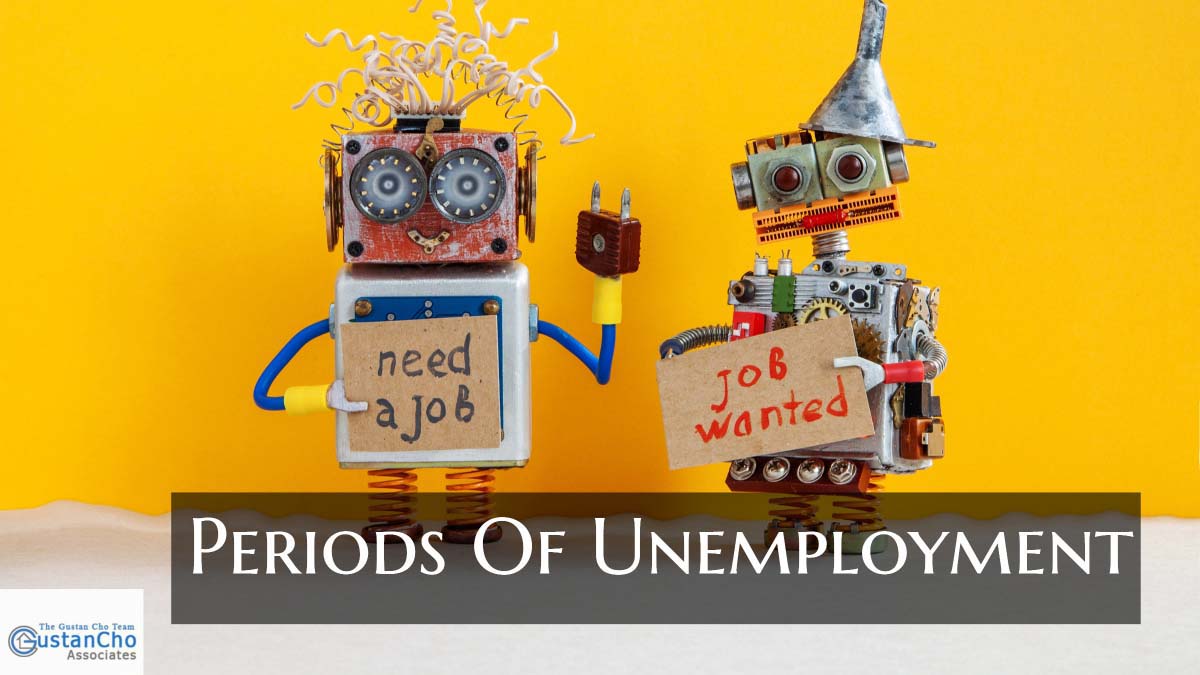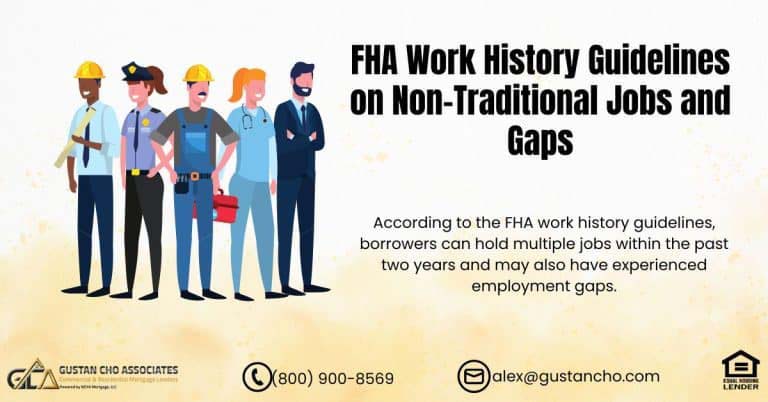This guide covers how do mortgage lenders view periods of unemployment. Qualified income is extremely important when qualifying for a residential home loan. Can borrowers qualify with gaps in employment in the past two years? The answer to the above question is an absolute YES. Most lenders do want to see a solid two-year full-time work history from the same employer. However, that is not often the case with some home buyers. John Strange, a senior mortgage loan originator at Gustan Cho Associates says the following about how do mortgage lenders view periods of unemployment:
Lenders can have their own overlays. Lenders can require two years of continuous work history with no gaps in employment history. There are lenders that will be lenient with gaps in employment history.
This holds true as long as the borrower has had a prior two-year work history. Borrowers can be off work for a year and still qualify for a mortgage loan . This holds true as long as he or she has been employed for at least six months. Any gaps in employment history six months or under require no seasoning requirement with the new job. This holds true as long as they can provide a recent paycheck stub and verification of employment. Verification of employment needs to state that the borrower’s employment is likely to continue for the next three years.
How Do Mortgage Lenders View Periods of Unemployment?
When you’re about to apply for a mortgage, your job history is one of the first documents a lender will examine. Gaps in your employment can trigger questions, but they aren’t an automatic “no” for getting your loan. Knowing how lenders weigh these gaps and how to present them can boost your chances of signing those closing papers. This guide gives you a clear look at how lenders examine periods of unemployment, the key details they focus on, and how to strengthen your mortgage application.
Unemployed? Learn How Lenders View Gaps in Employment
Understand how a period of unemployment affects your mortgage application and what you can do to improve your chances.
Why Employment History Matters to Mortgage Lenders
Mortgage lenders look at your job history to determine if you can make the monthly mortgage payments over the life of the loan. A regular paycheck shows you’re financially solid, and that’s what they want to see. It can raise a flag if you’ve been unemployed, since it suggests your income might not be steady. Still, lenders don’t treat all unemployment the same way. They consider how long you were out of work, when it happened, and the situation. For example, a brief layoff followed by a new job in the same field may not worry them as much as a long gap with no clear professional purpose.
Key Factors Lenders Consider
- Duration of Unemployment: Lenders worry less about a short gap of a few months than about longer breaks of six months or more.
- A work history that shows two or more years on the job, with few breaks, carries more weight in their eyes.
- Reason for Unemployment: The story behind the gap matters.
- Lenders may be more sympathetic if you lost your job due to a layoff, a medical issue, or caregiving.
- They might ask more questions if you quit without a backup plan.
- Current Employment Status: The job you have right now matters the most.
- Holding a steady position with a predictable income lessens the impact of a past job gap, especially if that gap happened more than two years ago.
- Industry and Job Stability: Certain fields, like construction or freelance work, have built-in downtime.
- Lenders who understand these cycles may look past short breaks if you can show that overall income remains solid.
- Financial Reserves and Savings: A healthy savings account or other income sources—like investments or unemployment benefits—during unemployment can signal that you’re financially responsible, which helps ease lender worries.
- Credit Score and Debt-to-Income (DTI) Ratio: Your credit score and DTI ratio matter more than ever during unemployment.
- Lenders are more likely to view your loan application positively if you kept your credit score and debt low while out of work.
How Different Mortgage Programs Handle Unemployment
Different mortgage programs treat unemployment differently. Here’s the lowdown on the most common loan types:
Conventional Loans
- Fannie Mae and Freddie Mac support programs usually require a two-year job record.
- If your gap is longer than six months, you must show that you are now employed and have a steady paycheck.
- A simple letter explaining your unemployment can help.
FHA Loans
- These loans, insured by the Federal Housing Administration, are friendlier to borrowers working for the first time or earning less.
- You can qualify with a shorter work record or a gap showing you are back on solid ground with a reliable paycheck.
VA Loans
- VA loans are available for veterans and active-duty service members. Look at your whole financial picture.
- A stretch of unemployment won’t rule you out if you have returned to steady work and meet the other basic VA rules.
USDA Loans
- USDA loans are designed for folks looking to buy homes in rural areas.
- They look at your job history, but that’s usually okay if you’ve had a little break in work.
- You can still qualify if you show steady paychecks and your total household income stays within their limits.
How to Strengthen Your Mortgage Application After Unemployment
If you’ve been out of work, you can still boost your mortgage application and give lenders confidence in your finances:
- Letter of Explanation (LOE): Write a short letter explaining why you were unemployed.
- Was it a layoff, a health issue, or did you return to school?
- Tell them what you did to bounce back and that you’re now in steady work.
- Show Your Income: Gather pay stubs, tax returns, W-2s, or 1099s to prove your income is back on track.
- If you work for yourself and your income is sometimes uneven, include recent bank statements or profit-and-loss reports.
- Boost Your Credit Score: A good score, preferably 700 or higher, can make lenders less worried about your job gap.
- Keep paying your bills on time, pay down any debt, and don’t apply for new loans or credit cards right before you apply for your mortgage.
How to Improve Your Home Loan Approval Chances After Job Loss
Lower Your Debt-to-Income Ratio
Keep your DTI under 50% to meet most conventional loan requirements. First, focus on paying off high-interest debts, like credit card balances. Lowering these balances improves your DTI and shows lenders you can handle monthly payments responsibly.
Save for a Larger Down Payment
Putting down 10% to 20% or more signals to lenders that you are financially disciplined. A bigger down payment also lowers your loan-to-value (LTV) ratio, boosting your approval chances and making monthly payments more manageable.
Work with an Experienced Lender
Some lenders and mortgage brokers specialize in helping buyers with unusual income paths, like self-employment or gig work. They can connect you to loan programs that consider your unique situation.
Common Scenarios and Lender Perspectives
Recent Unemployment (Less Than 6 Months Ago)
If you just got a new job, lenders usually want to see 30 to 60 days of paychecks before they’ll consider you. They will check how stable your job is and whether your income is consistent with your new role.
Unemployment for Education or Training
Suppose you were unemployed to earn a degree or a certification that leads to a better job. In that case, most lenders will view that positively. They’ll want proof, like an acceptance letter or a new pay stub, showing your new salary is higher or more stable than before.
Temporary, Freelance, or Gig Work
Suppose you’ve worked as a seasonal, freelancer, or gig worker. In that case, lenders typically look back at two years to check your average income. Be ready to provide pay stubs, 1099 forms, or tax returns to prove you’ve earned a steady income, even if there are gaps in your work history.
Extended Unemployment
Lenders could see this as a risk if you’ve been out of a job for over six months. To overcome this, you should be able to prove you’re now employed, show a strong savings balance, or document income from other sources, like investments or rental properties, that kept you afloat during that time.
Unemployment Periods and Your Mortgage Application
We’ll show you how lenders assess periods of unemployment and the best ways to handle it.
FAQs About Unemployment and Mortgage Applications
Can I Get a Mortgage If I’m Currently Unemployed?
- It’s tough, but not impossible.
- A lender may still say yes if you have income from investments, rental properties, or a steady co-borrower.
- Non-QM loans can also be a pathway.
How Long Do I Need to Be Employed After Unemployment?
- Most lenders want to see 30-60 days of pay stubs from your new job, while others may ask for a full six months, especially if you’re applying for a conventional mortgage.
Will Unemployment Affect My Credit Score?
- Not directly.
- If you miss payments or take on more debt while unemployed, that could hurt your score.
- Keeping credit cards paid and bills on time is key.
Can Unemployment Benefits Count as Income?
- Some lenders may let you include unemployment as income.
- Still, since it’s temporary, it usually won’t meet the requirements for many loan programs.
Wrapping Up
Having gaps in your work history won’t automatically shut the door on mortgage approval, but those gaps can make things trickier. Lenders care most about whether you can make the monthly payments, so showing you’ve got steady work right now, a good credit score, and a debt-to-income (DTI) ratio that’s on point is the way to go. You can boost your odds by clearly explaining the gaps, backing everything up with paperwork, and presenting a strong financial picture. If unsure where you stand, a mortgage expert can review your situation and point you to the best loan options.
Are you thinking about starting your mortgage application? Contact a lender today to review your employment history and find the perfect loan.
How Do Mortgage Lenders View Periods of Unemployment: Case Study On A Recent Closing
I just closed on a mortgage loan where the home buyer has gotten a mortgage loan denial by several lenders due to having gaps in employment history. It was an extreme case and a great example of how I can get mortgage loan approvals for borrower’s who has gotten denied for a loan for having gaps in employment
Here is the case scenario:
- My borrower has taken 9 months off work in 2012 due to medical reasons.
- She then went back to work and quit her job in February of 2013 within three weeks of returning to work.
- Her hourly wage was $9.00 per hour.
- She then got another job in March of 2013 making $12.00 per hour.
- However, she only worked 20 to 30 hours per week due to her being on a probationary basis.
- In September 2013 she completed the probationary period and was given a guaranteed 40 hours per week
She applied for a mortgage loan with me on November 15, 2013, after getting denied by many mortgage lenders due to her gaps in employment. I got a approve eligible via Fannie Mae’s Automated Underwriting System. There are lenders with no lender overlays. The approve eligible DU FINDINGS is the mortgage approval.
How Do Mortgage Lenders View Periods of Unemployment: Overlays versus Agency Guidelines
Mortgage lender overlays are additional guidelines that is above and beyond of HUD, VA, USDA, Fannie Mae and Freddie Mac. For example, HUD has a minimum agency guideline of requiring borrowers to have a 580 credit score for a 3.5% down payment FHA loan. HUD allows borrowers to qualify for an FHA loan with a credit score lower than 580 and down to 500 FICO. However, any borrower with under a 580 credit score requires a 10% down payment. However, many lenders may have lender overlays of requiring a 620 or 640 credit scores for an FHA loan. Many lenders also have lender overlays for not accepting borrowers with under a 580 credit score on FHA loans even though HUD allows borrowers with under 580 credit scores and down to 500.
Lenders with No Overlays
Gustan Cho Associates has no overlays:
- Gustan Cho Associates approve and close all borrowers with AUS Approval with no lender overlays.
- Our underwriters give thumbs up on all automated approvals and are ready to underwrite and close loans on time.
- We used her current income of $12.00 per hour.
- We needed to verify two-year employment history.
- Since she had a 9-month gap in employment back in 2012, we needed to get a verification of employment dating back to 2011 from a previous employer.
- Everything checked out and we closed the mortgage loan on time.
College Graduates Without 2 Year Employment History
How do mortgage lenders view periods of unemployment with college students?
- The team at Gustan Cho Associates deals with many first time home buyers who are first time home buyers but lack the two-year employment history requirement.
- The good news is that as long as the home buyer has been a full-time student and just got a job, the two-year employment history is waived.
- The time the home buyer was a full-time student is counted the same as work experience.
How Do Mortgage Lenders View Periods of Unemployment: Gaps In Employment Guidelines on 1099 Versus W-2 Wage Earner
Borrowers who are 1099 wage earners need two years of employment as a 1099 wage earner to qualify.
- 1099 wage earners are considered self-employed borrowers.
- Mortgage guidelines state that for self-employed borrowers, 2 years of income taxes is required.
- If a W-2 employee goes from a W-2 employee to a 1099 wage earner, that borrower needs two years of employment history as a 1099 wage earner to qualify for a mortgage.
- However, if a 1099 wage earner goes to a W-2 wage earner, then the two year requirement is waived and this borrower can qualify right away.
- 30 days of paycheck stubs and an offer employment offer letter is required to qualify.
Gustan Cho Associates is a national lender with no overlays on government and conventional loans. We have no overlays with gaps in employment. Borrowers do not need to be in the same job for the past two years to qualify for a mortgage with us. Home Buyers and homeowners needing to qualify for a mortgage with a direct lender with no mortgage overlays on government and conventional loans, please contact us at 800-900-8569 or text us for faster response. Or email us at gcho@gustancho.com. We are available 7 days a week, evenings, weekends, and holidays.
This BLOG on how do mortgage lenders view periods of unemployment was UPDATED on July 21, 2025.
- Related> Gaps In Employment: Update
- Related> How Do Mortgage Lenders View Gaps In Employment
- Related> Employment Gaps
Unemployment History? Here’s How Mortgage Lenders Evaluate It
Learn how periods of unemployment are viewed and the steps to take to get back on track for mortgage approval.








